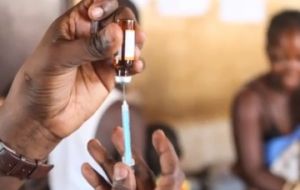MercoPress. South Atlantic News Agency
Region of the Americas is declared free of measles by World Health Organization
 Measles is the fifth vaccine-preventable disease the Americas have eliminated following eradication of smallpox, poliomyelitis, and rubella and congenital rubella
Measles is the fifth vaccine-preventable disease the Americas have eliminated following eradication of smallpox, poliomyelitis, and rubella and congenital rubella  “This is a historic day for our region and indeed the world,” said PAHO/WHO Director Carissa F. Etienne.
“This is a historic day for our region and indeed the world,” said PAHO/WHO Director Carissa F. Etienne.  Before mass vaccination was initiated in 1980, measles caused nearly 2.6 million annual deaths worldwide.
Before mass vaccination was initiated in 1980, measles caused nearly 2.6 million annual deaths worldwide. The Region of the Americas is the first in the world to have eliminated measles, a viral disease that can cause severe health problems, including pneumonia, blindness, brain swelling and even death. This achievement culminates a 22-year effort involving mass vaccination against measles, mumps and rubella throughout the Americas.
The declaration of measles’ elimination was made by the International Expert Committee for Documenting and Verifying Measles, Rubella, and Congenital Rubella Syndrome Elimination in the Americas. The announcement came during the 55th Directing Council of the Pan American Health Organization/World Health Organization (PAHO/WHO), which is currently underway and is being attended by ministers of Health from throughout the Americas.
Measles is the fifth vaccine-preventable disease to be eliminated from the Americas, after the regional eradication of smallpox in 1971, poliomyelitis in 1994, and rubella and congenital rubella syndrome in 2015.
“This is a historic day for our region and indeed the world,” said PAHO/WHO Director Carissa F. Etienne. “It is proof of the remarkable success that can be achieved when countries work together in solidarity towards a common goal. It is the result of a commitment made more than two decades ago, in 1994, when the countries of the Americas pledged to end measles circulation by the turn of the 21st century.”
Before mass vaccination was initiated in 1980, measles caused nearly 2.6 million annual deaths worldwide. In the Americas, 101,800 deaths were attributable to measles between 1971 and 1979. A cost-effectiveness study on measles elimination in Latin America and the Caribbean has estimated that with vaccination, 3.2 million measles cases will have been prevented in the Region and 16,000 deaths between 2000 and 2020.
“This historic milestone would never have been possible without the strong political commitment of our Member States in ensuring that all children have access to life-saving vaccines,” Etienne continued. “It would not have been possible without the generosity and commitment of health workers and volunteers who have worked so hard to take the benefits of vaccines to all people, including those in vulnerable and hard-to-reach communities. Indeed it would not have been possible without the strong leadership and coordination provided by PAHO, Regional Office for the Americas of WHO.”
Measles transmission had been considered interrupted in the Region since 2002, when the last endemic case was reported in the Americas. However, as the disease had continued to circulate in other parts the world, some countries in the Americas experienced imported cases. The International Expert Committee reviewed evidence on measles elimination presented by all the countries of the Region between 2015 and August 2016 and decided that it met the established criteria for elimination. The process included six years of work with countries to document evidence of the elimination.
Measles is one of the most contagious diseases and affects primarily children. It is transmitted by airborne droplets or via direct contact with secretions from the nose, mouth, and throat of infected individuals. Symptoms include high fever, generalized rash all over the body, stuffy nose, and reddened eyes. It can cause serious complications including blindness, encephalitis, severe diarrhea, ear infections and pneumonia, particularly in children with nutritional problems and in immuno-compromised patients.
As a result of global measles elimination efforts, only 244,704 measles cases were reported worldwide in 2015, representing a significant decline from earlier years. However, more than a half of these reported cases were notified in Africa and Asia.
To maintain measles elimination, PAHO/WHO and the International Expert Committee have recommended that all countries of the Americas strengthen active surveillance and maintain their populations’ immunity through vaccination.
“I would like to emphasize that our work on this front is not yet done,” warned Etienne. “We cannot become complacent with this achievement but must rather protect it carefully. Measles still circulates widely in other parts of the world, and so we must be prepared to respond to imported cases. It is critical that we continue to maintain high vaccination coverage rates, and it is crucial that any suspected measles cases be immediately reported to the authorities for rapid follow-up.”




Top Comments
Disclaimer & comment rules-

-

-

Read all commentsIt's a great achievement, now sadly threatened by the idiotic and irresponsible Anti-Vaxxers in the US. There's still outbreaks every year due to imported cases and these are easily spread by unvaccinated adults and children.
Sep 29th, 2016 - 12:40 pm 0What I am waiting for is a vaccine to prevent commie Marxist bastards infesting the governments of SA!
Sep 29th, 2016 - 05:36 pm 0The eradication of the present outbreaks could be simply achieved by administrating a 9mm injection horizontally from the front into the nasal cavity and the vaccine would prevent future infestations.
@2 ChrisR
Sep 29th, 2016 - 08:22 pm 0Now you are advocating murdering people just because you disagree with them politically? Tell me again how that is different from the juntas that, not so long ago, were making your dream a reality?
Commenting for this story is now closed.
If you have a Facebook account, become a fan and comment on our Facebook Page!